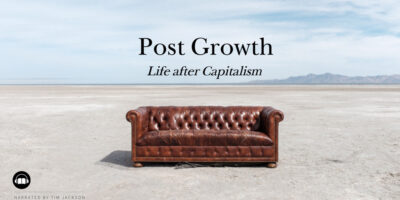Finding flow: exploring the potential for sustainable fulfilment
Journal Paper by Amy Isham and Tim Jackson
The Lancet Planetary Health | January 2022

Summary
Materialistic values and lifestyles have been associated with detrimental effects on both personal and planetary health, the need to identify activities and lifestyles that both promote human wellbeing and protect ecological wellbeing is increasingly pressing.
In this Personal View, we explore the dynamics of a psychological state known as flow, in which people are shown to experience high levels of wellbeing through involvement in challenging activities that require some level of skill, and can often involve less materially intensive activities.
By synthesising the results of a series of experience sampling, survey, and experimental studies, we identify optimal activities that are shown to have low environmental costs and high levels of human wellbeing.
We also confirm that materialistic values tend to undermine people’s ability to experience a flow state. In seeking to understand the reasons for this negative association between materialism and flow experiences, we are drawn towards a key role for what psychologists call self-regulation.
We show, in particular, that the tendency to experience a flow state can be limited when self-regulatory strength is low and when people evade rather than confront negative or undesirable thoughts and situations. We reflect on the implications of these findings for the prospect of sustainable and fulfilling lifestyles.
Introduction
Within consumer cultures, the so-called good life is often presented as an affluent one, replete with an inexhaustible supply of material goods. At the national level, this strong desire for consumer goods presents problems for both the environment and societal wellbeing. Increasing rates of production and consumption place devastating pressures on the earth’s ecological resources, contributing to problems such as climate change, biodiversity loss, and resource depletion. However, at the same time, these increases in material wealth appear to have an ambivalent relationship in terms of human subjective wellbeing. Beyond the satisfaction of basic needs (eg, food, shelter, and access to health care), increased consumption does not consistently deliver greater happiness. Despite consistent increases in the gross domestic product (GDP—a measure of the monetary values of the goods and services produced and consumed within a nation), reported levels of happiness have remained largely unchanged, particularly in advanced economies, such as the USA and the UK. Emerging research is also showing that in countries experiencing consumption growth, as measured by GDP and carbon footprint per capita, consumption is not linked to happiness levels.
Furthermore, at the individual level the vision of a materialistic good life is problematic. When individuals internalise the opinion that happiness and status can be achieved via the acquisition of material goods, they tend to show less environmental concern, be less inclined to engage in pro-environmental behaviours, and produce more greenhouse gas emissions. The association between the possession of strong materialistic values and low personal wellbeing is also well documented. Those individuals placing more importance on acquiring consumer goods to improve their happiness and status have been shown to report lower life satisfaction and less self-esteem, higher levels of depression and anxiety, and less purpose in life.
If materialistic lifestyles are both ecologically unsustainable and psychologically unfulfilling, it is clearly worth asking how the opposite case scenario might be possible; specifically, how could we enhance human wellbeing while limiting our ecological pressures on the planet? Human wellbeing clearly has material components, but it is far more than simply the absence of material poverty. Human wellbeing encompasses a subjective component, in which individuals feel satisfied with their lives and experience frequent positive emotions, alongside a eudaimonic component, in which individuals are able to act in ways that are meaningful and help to fulfil their potential. Clearly, not all of these aspects can be provided solely by consumer goods. Therefore, the prospect of having higher levels of wellbeing while inflicting less damage on the planet in the process is surely worth exploring.
. . .
The full paper is available in open access format via the Science Direct website. If you have difficulties accessing the paper, please get in touch: info@cusp.ac.uk.
Citation
Isham A and T Jackson 2022. Finding flow: exploring the potential for sustainable fulfilment. In: The Lancet Planetary Health, Vol 6/1. https://doi.org/10.1016/S2542-5196(21)00286-2



